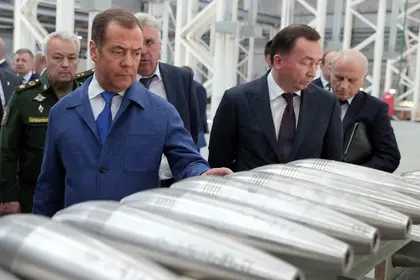Russian ex-president says The Times editors are “legitimate targets” after assassination of Moscow’s chemical general
A few hours after Britain’s The Times ran an editorial on Wednesday describing the assassination of Russian Lt. Gen. Igor Kirillov as a “legitimate act of defense” on the part of Ukraine, the Kremlin said that the newspaper should “be careful” and that its senior staff are now “legitimate military targets.”
“All these individuals can and should be considered legitimate military targets for the Russian state,” former Russian president Dmitry Medvedev wrote on social media. “And for all Russian patriots, for that matter.”
JOIN US ON TELEGRAM
Follow our coverage of the war on the @Kyivpost_official.
Medvedev, currently the deputy chairman of the federation’s Security Council, has traditionally been tasked with issuing veiled nuclear warnings against the West and all manner of outlandish threats that are beneath even Russian autocrat Vladimir Putin’s threshold of decorum.
“The people who committed the crimes against Russia... always have accomplices,” Medvedev continued. “These may include the lousy jackals from The Times, who cowardly hid behind an editorial. Meaning, the publication’s entire management team.”
Russian investigators pinned Kirillov’s killing in Moscow on a 28-year-old Uzbek citizen connected to the Security Service of Ukraine (SBU). According to investigators, footage from the suspect’s camera was streamed live to the attack’s organizers in Dnipro, Ukraine. When Kirillov exited his building, the explosive device was remotely detonated.

‘We’ll All Die as One for the Tsar’ – Man Fears Putin Turning Russia into North Korea
“I came to Moscow on the instructions of Ukrainian special services. I bought a scooter, and later, the materials for the bomb arrived. I placed it near the general’s house. When he left, I pressed the button. I was promised $100,000 and a European passport,” the suspect told his interrogators from the FSB, the Russian successor to the Soviet KGB.
An SBU security source reportedly has confirmed to AFP that it was behind Tuesday’s killing, in what it called a “special operation” targeting a “war criminal”.
In a social media post, British Foreign Secretary David Lammy described Medvedev’s remark as a “gangster threat” that “smacks of desperation.”
“Our newspapers represent the best of British values: freedom, democracy, and independent thinking,” Lammy said. “I stand with The Times.”
A spokesperson for the British prime minister’s office said Medvedev’s threats were “simply the latest in a stream of desperate rhetoric coming out of Putin’s government.
“Unlike in Russia, a free press is a cornerstone of our democracy and we take any threats made by Russia incredibly seriously,” he said.
Russia's Medvedev’s gangster threat against Times journalists smacks of desperation.
— David Lammy (@DavidLammy) December 18, 2024
Our newspapers represent the best of British values: freedom, democracy and independent thinking. I stand with @thetimes. pic.twitter.com/L6jscmESgn
After meetings in Kyiv, UK Defense Ministry announces new package, including air defenses
Early Thursday morning, after Foreign Minister Rustem Umerov and his British counterpart John Healy had met in Kyiv on Wednesday, the UK announced a £225 million ($286 million) military aid package for Ukraine for 2025, including drones, boats, and air defense systems.
“The depths of [Putin’s] miscalculation are clearer than ever, as the brave people of Ukraine continue to defy all expectations with their unbreakable spirit,” Healey said.
“But they cannot go it alone.”
In July, the British government vowed to commit £3 billion (about $3.8 billion) annually in military aid to Kyiv over the next six years.
Meanwhile, President Volodymyr Zelensky met with French President Emmanuel Macron on Wednesday, just before the Ukrainian leader sat down with other European and NATO leaders in Brussels.
Macron confirmed his country’s commitment to send more air defense systems to Ukraine and ensure that Kyiv is well-set to negotiate with Moscow from a position of strength when that time comes.
“I had a productive meeting with French President Emmanuel Macron. We had a detailed one-on-one discussion, focusing on key priorities to further strengthen Ukraine’s position against Russian aggression. A clear focus remains enhancing air defense capabilities,” Zelensky reported from Paris on social media.
In Brussels, Zelensky met with NATO Secretary-General Mark Rutte and leaders from Germany, Poland, Italy, Denmark, and the Netherlands at the NATO chief’s official residence, reportedly to develop a strategy for the allies’ cooperation in Ukraine’s defense after the inauguration of incoming US President Donald Trump in January.
Trump has complained that European members of the alliance have not contributed enough to defense spending and that any ceasefire in Ukraine will be enforced by European troops and not Americans.
In a joint press conference with Rutte, Zelensky called it a “very good opportunity to speak about security for Ukraine, today and for tomorrow.”
World Bank set to distribute the first slice of G7 funded loan backed by frozen Russian assets.
The World Bank on Wednesday approved a $2 billion loan to Ukraine, partly financed by a cut of the $20 billion that the United States has set aside for the country’s economic stability, funded by returns on frozen Russian assets.
The first part of this loan is composed of a $1.05 billion allotment that Ukraine will receive through the International Bank for Reconstruction and Development (IBRD), supported by Japan and the UK.
The remaining $1 billion is a grant from the World Bank’s Facilitation of Resources to Invest in Strengthening Ukraine Financial Intermediary Fund (FORTIS Ukraine FIF), underwritten by the US loan.
In all, the G7 nations have pledged $50 billion in economic-security loans to Ukraine, drawing on proceeds from frozen assets in the US and Europe.
You can also highlight the text and press Ctrl + Enter










